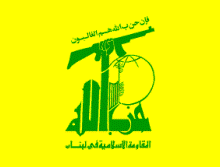
Hezbollah military sources revealed on Tuesday that that in case of a new war between the party and Israel, the latter will be targeted with a “different kind, quantity, and intensity of rockets” than the July 2006 war.
They said that the party has increased its rocket power, and Israel should be expected to be bombarded with 15 tons of explosives a day if it waged a war on Lebanon.
The sources told the Kuwaiti daily al-Rai: “If we assume that Hezbollah possesses the same kind, caliber, or parts of rockets that Iran has, then that means that the Zilzal rocket, which holds a ton of explosives, and Fateh-110 and M600 rockets, each carrying half a ton of explosives, will be used in the next war.”
They continued that Hezbollah will not rely on the balance of terror, but “the strategic balance, in light of its capabilities” allowing it to launch at least ten of any of the above mentioned rockets on a daily basis, culminating in about 15 tons a day.
They added that during the July 2006 war, Hezbollah launched some 4000 rockets and missiles, including Katyusha and Fajr rockets among others.
The total weight of explosives in the 33-day war amounted to some 50 tons, “which is about 15 percent of what the party is capable of today.”
As for the short range rockets, such as Grad, Fajr, and Khaybar, holding a weight of explosives ranging from 10kg to 45kg,Hezbollah can launch about 600 of them daily, equaling 27 tons.
The sources said: “It is up to Israeli Prime Minister Benjamin Netanyahu to estimate the number of tons of explosives that will fall on the Israelis because he decides when the war will begin, but he will definitely not be able to control the rockets’ trajectory, size, or where they will land.”
In addition, they stressed that Israel’s current anti-ballistic missile system “will only be able to affect 10 to 20 percent of our rocket attacks, meaning that it is guaranteed that 25 tons of explosives will be hitting their targets daily,” which equals half of what was launched against Israel in the entire 33-day war.
The sources noted that Israelis were only supplied with gas masks in preparation for a next war if it took on a biological aspect, saying that they were not provided with protective suits that guard them from mustard, cyanide, or VX gases in case Syria became involved in the war, and if Israel were the first to use non-traditional weapons.
Furthermore, the Hezbollah sources said: “If the war were to be long, then Israel will not escape massive economic losses that will cripple the Jewish state … for a long time, especially in light of the deteriorating economic situation in Europe and the United States.”
They concluded that the Israeli Air Force commander’s belief that Israel can defend itself from simultaneous Hezbollah and Hamas attacks is “inaccurate, because Israel can decide when to start the war, but it cannot deter Hezbollah on its own, which is something it learned from the July 2006 war. Naharnet

Leave a Reply
You must be logged in to post a comment.